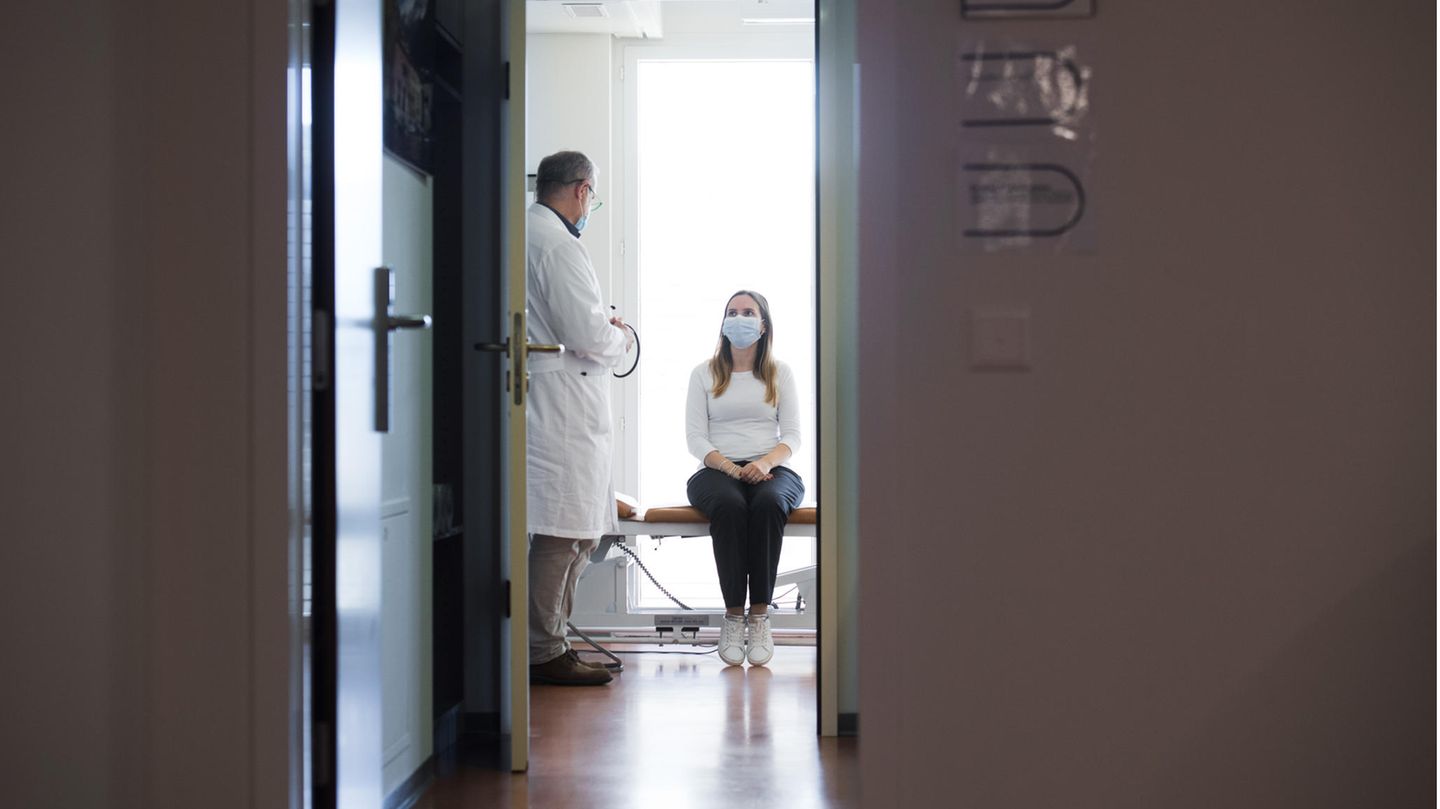The corona infection is over, but the symptoms do not subside – or only come afterwards. The long-term effects are varied, persistent and difficult to treat. An overview of what we now know about Long Covid.
Many who have survived Covid 19 disease are considered recovered, but they are not healthy. You continue to suffer from symptoms, are constantly exhausted and tired, short of breath, and have pain even weeks and months after the infection. Long Covid has many forms, is difficult to diagnose and treatment is difficult. Researchers are working flat out to find out more about the long-term effects. An overview of the most important questions.
When does Long Covid begin?
If the symptoms have not disappeared four weeks after being infected with Sars-COV-2, it is called Long Covid. A distinction is made in three phases:
- Acute Covid-19: Symptoms last up to four weeks after infection
- Persistently symptomatic Covid-19: Symptoms persist four to twelve weeks after infection
- Post-Covid-19 Syndrome: Symptoms persist after more than twelve weeks
- Long Covid: If a corona patient develops further symptoms four weeks after the infection, one speaks of Long Covid, as well as if the symptoms last longer than four weeks.
Who will get Long Covid?
Studies now show that a large proportion of those infected subsequently suffer from long-term damage. Although people who were seriously ill with Covid-19 seem to be significantly more likely to be affected by long-term consequences, so that. But it can also catch people with very mild and mild disease processes. One found that around one in ten people who had no or only minor corona symptoms still carried symptoms around with them months after the acute illness, such as tiredness and breathing difficulties. Young people without previous illnesses were also affected.
It is noticeable that women seem to suffer from long-term consequences more often. In a cohort study with 1,000 convalescents, researchers from the Infection Center at the Cologne University Hospital found that women were twice as likely to suffer from long-term symptoms as men. Physician Carmen Scheibenbogen also shares this observation. In an interview with “Deutschlandfunk” she said: “Younger or middle-aged people tend to develop autoimmune diseases, and it also fits that women are affected much more often because women usually have a more active immune system and therefore more easily develop autoimmune diseases.”
A study by King’s College published in also found that the risk of developing Long Covid increased with age and with a higher body mass index. Another indication could be the amount of symptoms that occurred during the acute phase of the illness. If there were more than five of the typical symptoms in the first week of illness, this subsequently led to Long Covid. In addition, people who had to be treated in hospital suffered more often from long-term effects.
And children are also affected. One that was recently presented evaluated the data of more than 10,500 children who were known to have been infected with Sars-CoV-2. According to this, about six percent struggle with long-lasting symptoms after an infection. Children who had to be treated in hospital were therefore twice as likely to be affected by Long Covid than those with a milder course of the disease. A particularly dangerous secondary disease in children is PIMS (Pediatric Inflammatory Multisystem Syndrome). It usually does not appear until weeks after the infection, which was usually normal. It is an inflammatory disease in which the immune system seems to be directed against the own body and among other things to high long-lasting fever, abdominal pain and diarrhea.
How many people are affected?
Since different studies estimate the proportion of Covid 19 sufferers who suffer from long-term effects very differently, the actual proportion “cannot yet be reliably estimated”, writes the RKI. “Of those declared as recovered, around 15 percent still have to struggle with a wide variety of symptoms,” said Andreas Rembert Koczulla from the German Society for Pneumology and Respiratory Medicine (DGP) to the “DPA”. The number of people with long-term consequences is 550,000 nationwide.
What are the symptoms of Long Covid?
The list of symptoms of Long Covid is long. The most common symptoms included headache, fatigue, difficulty breathing, memory problems, and difficulty concentrating. But circulatory problems such as palpitations, sleep disorders, pain, noise and light sensitivity are also part of it. It is now known that the damage can spread over the whole body. Long-term effects on tissues and organs were found. quoted from a study according to which at least one organ damage was discovered in almost 70 percent of those examined four months after infection. Several organs were affected in a quarter. All organs that have so-called ACE2 cell receptors were affected.
Lung problems are among the most common long covid symptoms. If the virus has damaged lung tissue, this can lead to a decrease in what is known as diffusivity and less oxygen enters the bloodstream. Most people, however, showed no signs of permanent or long-term lung damage, the writes. It was likely that only people at high risk of developing breathing difficulties, including the elderly, those with acute respiratory distress syndrome, and those with prolonged hospital stays and those with pre-existing lung abnormalities, were likely to develop fibrotic changes in lung tissue.
Covid-19 can also damage the heart. Researchers from Frankfurt University Hospital, for example, found evidence of this. They examined the hearts of 100 recovered patients. Heart damage was found in three out of four patients – regardless of previous illnesses or the severity of the Covid 19 infection. The most common discoveries included decreased pumping capacity, myocarditis, pericarditis and scarred heart tissue.
But one symptom stands out from the myriad of symptoms. The fatigue symptom is named as the most common symptom in many studies. It describes a state of persistent tiredness, exhaustion and listlessness that cannot be managed with sleep
How long will Long Covid stay?
A research group at Heidelberg University Hospital has investigated the question. As part of a study, the team observed 96 participants whose corona disease was at least five months ago over several months. It turned out that the majority of the participants had not fully recovered even a year after the infection, around 73 percent continued to suffer from the after-effects of the disease. More than half of those affected suffered from reduced physical performance (56.3 percent) and fatigue (53.1 percent). But shortness of breath, concentration problems, word-finding disorders and sleep problems are also among the most common symptoms.
With just under 100 participants, the study is a relatively small one, including many people who were seriously ill with Covid-19. With these, the risk of long-term damage is rated higher than with those who only had mild or moderate disease courses.
What are the treatment options?
Therapy is based on the symptoms. There is currently no scientifically reliable evidence for a specific therapy, according to one that several specialist societies recently published jointly. It lists diagnostic recommendations and therapy options for various symptoms such as fatigue, olfactory disorders, cardiological, neurological and psychiatric aspects.
The researchers are currently working on a variety of different treatment approaches. Oxygen therapy is one of them. Pressure chambers are used for this. During these approximately two hours a day, the patients breathe pure oxygen for several weeks. The first treated would speak of positive effects, explained the head of the pressure chamber center in Aachen, Dr. Ullrich Siekmann, the “WDR”. However, the approach has not yet been tried and tested, and several studies are ongoing.
Doctors see another treatment option in blood washing. In the so-called “HELP apheresis”, the blood is freed of harmful substances similar to dialysis. Blood washing is already used in people who have had strokes or heart attacks and who cannot be helped with other medication. The procedure has also been used with Long Covid patients.




